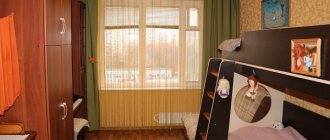2
14609
The decision to purchase a room in a communal apartment is often the first step in resolving the issue of living space. This is the least expensive segment of the real estate market, accessible to most interested parties. By purchasing a room, you can obtain a legal permanent residence permit and resolve housing issues.
Quite often, attention is paid to rooms during the exchange and departure of members of the same family, when it is necessary to obtain several separate possessions from one object. The rooms are decorated according to the same principle as is established for the entire property. At the same time, interested parties are advised to familiarize themselves with some of the features of the procedure.
Rules for urgent purchase of a room
If we are talking about municipal housing, then urgent acquisition will require permission from the administration. In the case of a privatized room, according to the law, the neighbors have the first right to purchase. The owner is obliged to notify neighbors in writing and indicate the main terms of the transaction: the cost and time frame of the sale. The neighbors sign their waiver, and only then can the room be put up on the open market.
In this case, the cost must coincide with that offered to neighboring residents. If citizens wish to buy the room, the transaction must be completed only with them. In the case of several willing neighbors, an auction is held and a specific buyer of the property being sold is identified.
How to get a bank loan (mortgage)?
If residents want to purchase premises in a communal apartment, but do not have the funds to complete the transaction, then they have the opportunity to obtain a bank loan. A mortgage loan is provided without any problems. Credit institutions positively assess the transactions discussed in this article.
The operation requires the complete transfer of rights to real estate to the buyer. The property will be used as collateral guaranteeing the return of funds to the lender. So, when taking out a loan, an encumbrance is placed on the room. You can withdraw it only after full payment of the principal amount of the debt and interest on the loan.
The credit institution makes demands on the client and the home he is purchasing. Most often, the beneficiary must meet the following criteria:
- age – 21-55 years;
- worked at the last place of employment for at least 6 months;
- total experience – one and a half years or more;
- monthly earnings sufficient to make payments.
If a citizen does not have sufficient income to make regular mortgage payments, then the FCO may consider the earnings of immediate relatives as a guarantee.
Housing parameters, in turn, should allow a family (a single citizen living alone) to stay in the premises without experiencing discomfort. This includes the area of the room, the availability of communications, etc. Requirements may differ in different banking institutions. Sometimes FCOs refuse to apply for a loan because they believe that the apartment is used by different people, which increases risks for the organization. However, if a person buys the last room, then there will be no problems getting a mortgage.
Buying out municipal housing: statement
Sometimes the room has no other owners and belongs to the local government. If there is a desire to purchase such real estate, a statement of the following type is written:
- personal data of the applicant;
- reasons for performing the procedure;
- technical information about the room;
- refusal of residents to purchase the space;
- receipt for repayment of the state fee.
The housing department of the administration has the right to request additional documents. For example, if the applicant lives in this apartment, is on a social waiting list for improved housing conditions, or is included in one of the preferential categories of citizens. The application is written in free form and must be literate and justified.
Documents attached to the application
The package of documents may vary in each specific case, but there is a standard package of information for all applicants:
- a copy of the applicant's passport;
- the tenant's lease agreement for a municipal facility;
- permission from the guardianship and trusteeship authorities, if the issue is about children;
- BTI technical passport;
- permission from neighbors to sell the room.
Sometimes a room has no occupants, is escheatable property, or is otherwise empty of occupants. In this case, those on the social queue are offered to buy it. If there are no people willing to purchase the room, a decision is made to conclude a free contract or sell it and transfer the funds to the municipal fund.
How to perform the procedure
If you want to buy a communal room in a municipal property, it is recommended to use the recommendations of experienced housing lawyers. Legal registration of such real estate is carried out in the following order:
- write an application on a standard form;
- sign the waivers of all apartment residents;
- collect the necessary information and submit it to the housing department;
- Having received a positive decision, consider the cost and sequence of the repurchase;
- within three months, make payment using the details provided and report to the municipality;
- obtain the right establishing documents.
The room becomes the property of the citizen after entering data into the unified state register. The administration and the citizen will be considered participants in the purchase and sale transaction, and a corresponding note will be made in the documents. In order for Rosreestr to accept the transaction for registration the first time, the package of information provided must include impeccable documents.
If questionable fragments or inconsistencies are identified, the transaction will be considered invalid and all steps will need to be completed again.
After the application is accepted by the housing department for consideration, the applicant will be provided with a certificate about the timing of the decision. If a citizen receives a refusal and protests, a court hearing of the dispute may be scheduled. Also, a dispute may arise regarding the valuation of the property; the applicant has the right to challenge the price of the room provided to him. All these nuances will delay the process, but in the end the transaction can be registered properly.
Cost of purchasing housing from the city
The assessment of the room can be entrusted to an independent expert organization that has the appropriate license. The resulting legal act serves as the basis for a dispute if there is disagreement between the parties. As a rule, the cost of the object is calculated by employees of the housing department in the immediate vicinity of the date of urgent purchase of municipal housing space.
If the deal falls through for objective reasons beyond the buyer’s control, then it becomes possible to find out how the price of the room was calculated. In other cases, the municipality is not required to report to the buyer how the settlement occurred. If the buyer disagrees, he or she will file a lawsuit against the administration. To accept a claim for consideration, you will need strong arguments for your position, namely an act of independent examination.
Review of judicial practice on the purchase of a vacant room in a communal apartment
On issues of granting the right to purchase at a commercial price the vacant space in a communal apartment in Moscow.
1. The moment the room is vacated.
1.1.
The right to annex a room does not arise if such a room was already vacant at the time the applicant moved in.
Guided by the requirements of Art. 59 LC RF, Art. 38 of the Moscow Law “On ensuring the right of residents of the city of Moscow to residential premises”, as well as the provisions of Art. Art. 12, 56, 67 of the Code of Civil Procedure of the Russian Federation, having established the factual circumstances of the case and correctly determining that the disputed residential premises for the plaintiffs is a vacant residential premises and not a vacant one, the judicial panel came to the correct conclusion to refuse to satisfy the claims, since the right to provide a room with an area 10.9 sq. m, under a social tenancy agreement in accordance with Art. The plaintiffs do not have Article 59 of the RF Housing Code.[1]
1.2.
The fact that at the time a person acquired the right of ownership the disputed room was already vacant does not mean that it is not vacant for him and, accordingly, does not exclude the emergence of his right to repurchase.
The court of 1st instance considered that the defendant’s argument that at the time the plaintiff acquired ownership of 2 rooms in the said apartment, rooms N *** and N *** were already free, and, therefore, are not for the plaintiff released, which means he has no right to redeem them, is arbitrary and not based on the law.
The judicial panel cannot agree with this conclusion of the court......
Analyzing the above rule of law, the judicial panel agrees with the position of the defendant that the concepts of “free” and “released” are not identical, but are closely linked to the time of the event.
….
From the explanations of the defendant’s representative, it is clear that these rooms were not occupied by the defendant for a long time due to the existence of an investment contract with Alber and Co. LLC and the subsequent resettlement of the residents of the house.[2]
1.3.
Vacancy of the disputed room before the applicant's ownership rights arise is grounds for refusal to grant the right of redemption.
In refusing to satisfy T.’s demands, the court correctly proceeded from the provisions of Art. 37 of Moscow Law No. 29 “On ensuring the rights of residents of Moscow to residential premises,” and came to the reasonable conclusion that rooms No. 1, No. 2 and No. 5 in apartment No. 2, located at the address: Moscow, st. *******, since they are not vacated for the applicant, since they were vacated by the previous user even before T. acquired ownership of rooms No. 3 and No. 4 of the disputed residential premises.[3]
1.4.
The fact that the disputed room is vacated before the person is registered in the apartment does not affect the right to buy out the room by a third party if there are no people in the apartment in need of improved living conditions.
Disagreeing with the court's decision, T. in her cassation appeal pointed out that the court had not established the time from which the room, which was the subject of the purchase and sale agreement dated - year, acquired the status of vacant and did not take into account that - year with P.O. a transfer agreement was concluded for this room.
This argument does not entail the reversal of the court decision, since the basis for the recommendation of the Public Housing Commission - in accordance with the extract from the protocol dated - was not the fact that the disputed room became vacant before T. was registered in this apartment, but that those in need of improvement there are no living conditions in the apartment, P.O. has been living in Moscow since — years, in this area since — years, and she asked to be given the right to buy out a vacant room with a living area of 19.2 sq. m. m into individual ownership.[4]
2.
Determination of redemption value.
2.1.
Housing and residential housing estates in Moscow are not obliged to sell the vacant room at the price determined by the appraiser hired by the tenant.
The obligation to conclude an agreement with the appraiser is assigned to the housing and property management company of the city of Moscow . Refusing to satisfy the claims, the court reasonably proceeded from the fact that the city of Moscow is the owner of the disputed rooms for the purchase of which the plaintiff is claiming, while the city of Moscow, represented by the housing and communal services company and Housing Foundation of Moscow, as the owner of residential premises, has, among other things, the right to dispose of the property belonging to it.
As follows from the provisions of Art. 555 of the Civil Code of the Russian Federation, the price of a contract for the purchase and sale of property is an essential condition of the contract; if there is no agreement on the price in the contract, it is considered not concluded, meanwhile, citizens and legal entities are free to conclude an agreement, coercion to conclude it is not allowed. Thus, the plaintiff and third parties do not have the right to force the defendant to enter into purchase and sale agreements at the price proposed by them; the law does not contain obligations for the defendant to conclude such an agreement with the plaintiff and third parties on the terms proposed exclusively by them.
In accordance with the provisions of Art. 10 of the Federal Law “On Valuation Activities in the Russian Federation”, the defendant DZhP and ZhF of the city of Moscow are given the right to enter into an agreement to assess the value of real estate owned by the city of Moscow, thus, the defendant’s appeal to assess the value of the disputed real estate is to the appraiser K. S.I. is legal and reasonable.
The court correctly based the court decision on the information reflected in the report of the appraiser K.S.Yu., since this conclusion is complete, scientifically sound, drawn up by a person whose competence and qualifications there are no grounds to doubt.
Under the above circumstances, the court rightfully did not take into account the reports on the assessment of the cost of rooms N ** and N **, compiled by a specialist from Consult Invest LLC.[5]
3.
Possibility of redemption in case of proposed demolition of the house.
3.1.
The refusal to grant the right to buy out a room in a house subject to demolition in accordance with the resolution of the Moscow Government is legal.
In accordance with Part 6 of Art. 38 of the Law of the City of Moscow of June 14, 2006 N 29 “On ensuring the right of residents of the city of Moscow to residential premises”, in the absence of citizens specified in parts 1 and 2 of this article in a communal apartment, other citizens living in this apartment have the right to buy at the market price the cost of a vacant room or several rooms.
Refusing S.I. in satisfying the claims, the court rightfully proceeded from the fact that, by virtue of paragraph 10 of Art. 4 of the Moscow City Law of May 31, 2006 No. 21 “On ensuring the housing rights of citizens during the relocation and vacancy of residential premises (residential buildings) in the city of Moscow”, after the adoption of a legal act of the Moscow Government, it is not allowed for the authorized executive body of the city of Moscow to provide residential premises in residential houses to be vacated, in connection with which I came to the conclusion that the decision of the housing and housing department of the city of Moscow to refuse to purchase the vacated living space in the house, which, in accordance with the resolution of the Moscow Government, was recognized as physically and morally obsolete, subject to demolition, by law does not contradict[6].
3.2.
The right to buy out a room may be granted in the event of an investment contract involving the resettlement of residents.
The court of 1st instance considered that the defendant’s argument that at the time the plaintiff acquired ownership of 2 rooms in the said apartment, rooms N *** and N *** were already free, and, therefore, are not for the plaintiff released, which means he has no right to redeem them, is arbitrary and not based on the law.
The judicial panel cannot agree with this conclusion of the court......
Analyzing the above rule of law, the judicial panel agrees with the position of the defendant that the concepts of “free” and “released” are not identical, but are closely linked to the time of the event.
….
From the explanations of the defendant’s representative, it is clear that these rooms were not occupied by the defendant for a long time due to the existence of an investment contract with Alber and Co. LLC and the resettlement of the house’s residents in the future.[7]
4.
The influence of the fact of residence on the possibility of redemption.
4.1.
The mere fact of not living in a room owned by right of ownership is not grounds for refusing the right to purchase the vacated room.
The panel of judges correctly drew attention to the fact that the mere fact that B. does not live in a room that belongs to him by right of ownership is not a basis for refusing the right to buy out the vacated room.
Taking into account the above, the court of second instance decided to satisfy B.’s claim and reject the independent claims of Kh. and Zh.O.
The court of second instance verified whether the plaintiff had the funds due for payment, and found that B. transferred a sum of money in the amount of *** rubles to the account of the Judicial Department.[8]
4.2.
The mere fact of not living in a room owned by right of ownership is not grounds for refusing the right to purchase the vacated room.
It is allowed to agree on the redemption price after filing claims. The claim regarding the recognition of the right to buy out a room and the obligation to conclude a purchase and sale agreement was satisfied, since the plaintiff, who has the right of ownership of a room in the disputed communal apartment, declared the purchase of a free room at the market price:
By refusing to satisfy B.V.’s demands, the court also violated the rules of substantive law, since there are no legal grounds for refusing to buy out the room.
According to Art. 38 clause 6 of the City Law. Moscow dated June 14, 2006 N 29 “On ensuring the right of residents of the city of Moscow to residential premises” in the absence of citizens specified in parts 1 and 2 of this article in a communal apartment, other citizens living in this apartment have the right to buy out the vacated one at market value room or several rooms.
B.V., who has the right of ownership of a room in the disputed communal apartment, announced the purchase of the vacant room No. 1 at the market price. Department of Housing Policy and Housing Fund of the Mountains. Moscow offered to buy the room for the price of (...) rubles. At the last court hearing, the plaintiff’s representative, having agreed with B.V. the specified amount, expressed consent, which is recorded in the minutes of the court session. The court unreasonably refused with reference to the fact that B.V. did not reside. in a room that belongs to him by right of ownership. The panel of judges believes that the court’s conclusion contradicts the provisions of Art. 30 of the Housing Code of the Russian Federation, which provides for the rights and obligations of the owner of residential premises.
Claims of B.V. on the obligation of the housing and housing estate in Moscow to conclude a purchase and sale agreement with him for room No. 1 in a communal apartment at the address: <...> are subject to satisfaction as complying with the requirements of the law. Funds in the amount of 2,791,000 rubles were deposited by the plaintiffs into the deposit account of the Judicial Department as confirmation of solvency[9]
5.
The right to purchase from other persons.
5.1.
Family members of the tenant do not have the right to buy out a vacated room, since they do not belong to the categories of persons for whom this right is provided.
Furthermore, in accordance with Art. 59 of the Housing Code of the Russian Federation, vacated residential premises in a communal apartment can be provided to persons living in this apartment under a social tenancy agreement, or to the owners living in this apartment.
Members of O.’s family do not belong to those specified in Art. 59 of the Housing Code of the Russian Federation to categories of persons who may be provided with free living quarters in a communal apartment, because they are neither the tenants of the residential premises occupied in the disputed communal apartment, nor the owners of this premises.[10]
5.2.
Only those persons who live in a communal apartment have the right to buy out a vacated room.
Clause 3 of Art. 59 of the Housing Code of the Russian Federation, paragraph 1 of Art. 37, paragraphs 1, 6 of Art. 38 of Moscow Law No. 29 of June 14, 2006 directly provides that only those persons who live in the communal apartment have the right to buy out residential premises vacated in a communal apartment.
Neither the Housing Code of the Russian Federation, nor the Law of Moscow No. 29 of June 14, 2006 contain rules providing for the right to buy out a vacant living space in a communal apartment from a person who does not live in this apartment.
Due to the above, O. does not have the right to buy out a free room in the disputed apartment, and therefore her right to this room cannot be considered violated by the contested Order of the Prefect of the Moscow Closed Joint-Stock Company No. 5037-RPZh dated December 14, 2010[11]
6.
Residual principle of the right of redemption.
6.1.
If there are no waiting lists in the apartment and there are low-income citizens in need of improved housing conditions (listed in Parts 1 and 2 of Article 38 of the Moscow Law), the owner of other rooms has the right to buy out the vacant room.
In a room measuring 16.5 sq. m. in the indicated apartment in the period from 2003 to July 2006, her father T.D. lived. under a short-term rental agreement for a period of 5 years. Due to the death of her father, the room became vacant and is currently empty. The defendant refuses to buy the room, offering, in order to free up space, a separate two-room apartment with a total area of 46.8 square meters. m. at the address: ——, with which the plaintiff does not agree and asks to oblige the defendant to transfer the vacated room to her by way of ransom...
……
Since, as the court established, there are no citizens listed in Parts 1 and 2 of Art. in the apartment at the named address. 38 of the above Law of Moscow, B.T. (T.T.) has the right to purchase the vacant room at its market value, which she intends to do. The refusal of the housing estate and housing estate of Moscow to sell her a room under such conditions was rightly declared illegal by the court of first instance.[12]
Similar output:
Considering the case, the court came to the correct conclusion that in this case Part 6 of Art. 38 of Law No. 29, according to which, in the absence of citizens specified in parts 1 and 2 of this article in a communal apartment, other citizens living in this apartment have the right to buy out a vacant room or several rooms at market value.
In this case, the court rightfully took into account the explanations of the plaintiff’s representative that the plaintiff knew the market value of the disputed room and agreed to such conditions.[13]
6.2.
Failure by the court to take into account the right to buy out a vacant room at a market price is grounds for canceling the decision.
From the contents of B.O.E.’s statement, it follows that she asked for permission to buy out the disputed room in the said apartment at market value, however, in the decision of the Housing Department and the Moscow Housing Fund, such a request was not allowed and the court of first instance did not check this circumstance.
At the trial court hearing, the defendant's representative also pointed out that there were no grounds for providing the vacated room; however, the issue of the possibility of purchasing the room at market value was not the subject of discussion at the court hearing.
…..
However, the court did not take into account that paragraph 6 of the said Law provides that in the absence of citizens specified in parts 1 and 2 of this article in a communal apartment, other citizens living in this apartment have the right to buy out a vacant room or several rooms at market value .
There are no judgments and conclusions in relation to the above-mentioned norms of substantive law in the court decision.
Since the court did not take into account the above provisions of Art. 38 of Moscow Law No. 29 of June 14, 2006, the legally significant circumstances in the case were incorrectly established, then the court decision cannot be recognized as legal and justified and, in accordance with paragraphs 1, 4, part 1 of Art. 362 of the Code of Civil Procedure of the Russian Federation, the court decision is subject to cancellation, and the case is subject to referral for a new trial to the court of first instance.[14]
7.
Admissibility of applying the legislation of a constituent entity of the Russian Federation.
7.1.
Provisions of Art.
Art. 37, 38 of Moscow Law No. 29 of June 14, 2006, in terms of establishing requirements for the period of residence in a subject of the federation and the period of non-commitment of actions leading to deterioration of living conditions, contradict Art. 59 of the RF Housing Code and are not subject to application. In support of this conclusion, the court referred to the provisions of Art. Art. 37, 38 of Moscow Law No. 29 of June 14, 2006, establishing additional provisions compared to Art. 59 of the Housing Code of the Russian Federation, requirements for persons applying for a free room in a communal apartment.
However, the court did not take into account that, by virtue of the provisions of Part 5 of Art. 76 of the Constitution of the Russian Federation, in the event of a contradiction between a federal law adopted on a subject of joint jurisdiction and an act of a subject of the federation, the federal law shall apply.
Provisions of Art. Art. 37, 38 of Moscow Law No. 29 of June 14, 2006, establishing additional requirements for persons applying for a free room in a communal apartment (in the form of a 10-year period of residence in Moscow and non-commitment of actions that entail deterioration of housing conditions, over the past 5 years), limit the rights of K.E.N. to provide her with a free room in the disputed communal apartment in comparison with the requirements of Art. 59 Housing Code of the Russian Federation.
The law of the city of Moscow, in terms of establishing requirements for the period of residence in a subject of the federation and the period of non-commitment of actions that entail a deterioration in living conditions, imposed on persons applying for the provision of free rooms in the communal apartment in which they live, contradicts Art. 59 of the Housing Code of the Russian Federation, which does not establish such requirements and which does not provide for the possibility of establishing additional requirements by the legislation of the subject of the federation.
In connection with the above, the provisions of Art. Art. 37, 38 of Moscow Law No. 29 of June 14, 2006, insofar as it contradicts Art. 59 of the RF LC are not subject to application to controversial legal relations.[15]
7.2.
Provisions of Part 6 of Art.
38 of Moscow Law No. 29 of June 14, 2006, establishing a different category of citizens for the provision of residential premises, are within the powers of the state authorities of the constituent entity of the Russian Federation in the field of housing legal relations and do not contradict Art. 59 Housing Code of the Russian Federation. At the same time, Art. 2 of the RF Housing Code establishes that state authorities and local self-government bodies, within the limits of their powers, provide conditions for citizens to exercise their right to housing.
According to Part 6 of Art. 5 of the Housing Code of the Russian Federation, state authorities of the constituent entities of the Russian Federation may adopt laws and other regulatory legal acts containing norms regulating housing relations, within the powers granted by the current federal legislation.
Clause 4 of Art. 13 of the said Code refers to the powers of state authorities of a constituent entity of the Russian Federation in the field of housing legal relations to determine other categories of citizens in order to provide them with residential premises of the housing stock of a constituent entity of the Russian Federation. By virtue of clause 9 of the same article, the powers of a constituent entity of the Russian Federation include other issues related to the powers of state authorities of the constituent entities of the Russian Federation in the field of housing relations by the Constitution of the Russian Federation, this Code, other federal laws and not included in the powers of state authorities of the Russian Federation , powers of local governments.
The court came to the conclusion that the norms of Part 6 of Art. 38 of the Moscow Law of June 14, 2006 N 29 “On ensuring the right of residents of the city of Moscow to residential premises” contradict the provisions of Art. 59 of the Housing Code of the Russian Federation, without taking into account the powers of state authorities of the constituent entity of the Russian Federation in the field of housing legal relations.
Thus, the court’s decision cannot be considered legal and justified, and therefore this decision on the basis of Art. 362 of the Code of Civil Procedure of the Russian Federation is subject to repeal and the case is sent for a new trial to the court of first instance.[16]
8.
Challenging decisions of the housing commission.
8.1.
The decisions of the housing commission do not have independent significance, are not binding on other persons, do not give rise to any rights and obligations for persons who apply to housing authorities, and have only advisory value for the body that has the right to make a decision on the issue raised by citizens.
The decision of the housing commission cannot be challenged in court and declared invalid. Recognizing the decision of the OZhK of October 3, 2010 (Minutes No. 43), which recommended providing a free room in the disputed communal apartment of K.E.N., as illegal and invalid, the court of first instance did not take into account that, in accordance with paragraph 3 of Art. 6 of Moscow Law No. 29 of June 14, 2006, housing commissions carry out preliminary consideration of issues and give conclusions in the form of recommendations.
By virtue of the above norm, decisions of the Housing Committee do not have independent significance, are not binding for execution by other persons, do not give rise to any rights and obligations for persons who apply to housing authorities, and have only advisory value for the body that has the right to make a decision on the given citizens issue.
Taking into account the above, the decision of the OJK could not be challenged in court and could not be declared invalid.[17]
9.
Deterioration of living conditions.
9.1.
The sale of an apartment that is personally owned by the tenant's spouse does not lead to a deterioration in the tenant's living conditions and cannot be grounds for refusal to provide a vacated room.
Guided by the resolution of the dispute, paragraph 1 of Art. 36 of the Family Code of the Russian Federation, Part 1, Art. 69 Housing Code of the Russian Federation, Part 2, Art. 1 of the Law of Moscow “On ensuring the right of residents of the city of Moscow to residential premises” dated June 14, 2006 N 29, the court correctly took into account the fact that M.E. entered into marriage with….. g., i.e. after registration for improvement of living conditions, and from the copy of the sale and purchase agreement available in the accounting file that belonged to M.D. apartment dated 06.08.2010 (case sheets 42 - 44) it follows that this apartment belonged to him on the basis of a transfer agreement, i.e. was acquired by him in a gratuitous transaction, and therefore was the personal property of M.D. and neither the applicant M.E. nor her daughters had rights in relation to this apartment; accordingly, its alienation could not lead to a worsening of the living conditions of the applicant and her daughters.[18]
Read more about the service of challenging the refusal to provide a vacated room
How much do the services cost and what does it include?
Order a service to challenge a DGI refusal
A review of the practice was carried out by specialists of “Corporations and Shareholders” when providing the service “lawyer in housing matters”
[1] Ruling of the Moscow City Court dated 07/17/2013 N 4g/5-6085/13 (social rent) [2] Ruling of the Moscow City Court dated 05/24/2012 in case No. 33-10149 (in satisfying the requirement for granting the right to repurchase, reason for the existence of an existing obligation to resettle) [3] Ruling of the Moscow City Court dated December 16, 2010 in case No. 33-39478 [4] Ruling of the Moscow City Court dated March 1, 2012 in case No. 33-6995 [5] Appeal ruling of the Moscow City Court dated 06.28.2013 in case No. 11-20180 (Plaintiff K.S.V. filed a lawsuit against the housing and housing estate of Moscow and asked to declare the Order of the Department of Housing Policy and Housing Fund of Moscow dated July 26, 2012 illegal and unfounded . N ** on determining the redemption value of vacant rooms in apartment N ***, located at the address: *** and also oblige the defendant to enter into an agreement for the purchase and sale of rooms at a price of *** rubles, to recover from the defendant the costs of paying the state duty in in the amount of ** rubles ** kopecks) [6] Appeal ruling of the Moscow City Court dated June 26, 2013 in case No. 11-19906/13 (on declaring illegal the refusal to purchase the vacant room No. 1 in apartment No. 30 of communal settlement at the address: ***, the obligation to conclude a purchase and sale agreement for this residential area at its market value) [7] Ruling of the Moscow City Court dated 05/24/2012 in case No. 33-10149 [8] Ruling of the Moscow City Court dated 04/24/2013 N 4g/1 -3129 (B. filed a lawsuit against the housing estate and housing estate of Moscow to declare the order invalid and the obligation to conclude a purchase and sale agreement) [9] Appeal ruling of the Moscow City Court dated January 18, 2013 N 11-293 [10] Determination of the Moscow City Court dated 12.12. 2011 in case No. 33-40990 [11] Ruling of the Moscow City Court dated December 12, 2011 in case No. 33-40990 [12] Ruling of the Moscow City Court dated March 26, 2012 in case No. 33-8902/12 [13] Ruling of the Moscow City Court dated July 22, 2011 in case No. 33-23045 [14] Determination of the Moscow City Court dated December 22, 2010 in case No. 33-37027/2010 [15] Determination of the Moscow City Court dated December 12, 2011 in case No. 33-40990 [16] Determination Moscow City Court dated 02.16.2011 in case No. 33-4153 (The decision of the court of first instance was canceled because the law of the city of Moscow was not applied) [17] Ruling of the Moscow City Court dated 12.12.2011 in case No. 33-40990 [18] Appeal ruling of the Moscow City Court dated March 22, 2013 in case No. 11-5698 (the plaintiff filed a petition with the court to declare illegal the decision of the Department of Housing Policy and Housing Fund of Moscow to refuse to provide her with free space for a family of three under a social rental agreement rooms in addition to the occupied living space)
Subsidy for the purchase of premises
If the family has an area of less than 9 square meters. m per member, then citizens have the right to receive a subsidy for the urgent purchase of a room. In this case, first of all, families that are registered and awaiting improvement in their living conditions are taken into account. The law allows you to use maternity capital as a contribution. Of particular importance is whether the family has a room in a given communal apartment, that is, there is an expansion in this territory.
If there are several applicants from among those standing on the municipal queue, priority is given to citizens who are the earliest to register for housing.
Who has the right to take action to purchase a room?
According to parts 1-3 of Art. 59 of the Housing Code of the Russian Federation, not all citizens can afford to formalize a transaction for the alienation of housing from the municipality. The list of persons who have the right to carry out the designated action includes tenants who need to improve their living conditions and are in the appropriate queue. In this case, persons must be recognized as low-income in the prescribed manner. The transaction can also be completed by persons who do not fit into the standard for area per person. Their income also should not reach the subsistence level established in the region. And the last category is those provided with living space that is less than the standard of representation.
Important! The first two of the designated categories of persons (families) have the right to receive housing under a social tenancy agreement. Citizens from the third group have the right to register a room only by concluding a purchase and sale agreement.
Each subject sets its own subsistence level and minimum wage. In this case, the first indicator is approved for the main population groups. Thus, if there are children and two able-bodied adults in a family, the average per capita income is calculated by adding these indicators and dividing the amount by the number of citizens living together. If the total family income is less than the minimum level established by law, then citizens are recognized as low-income. The status is verified upon receipt of the document upon personal application of those in need. Taking into account the situation of tenants of communal housing, the authorities provide benefits.










